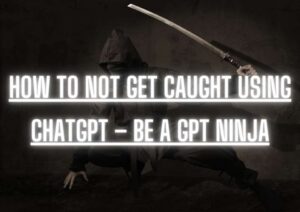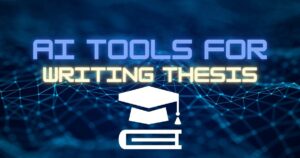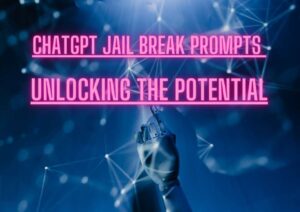Can ChatGPT write A Novel
In an age where AI continues to reshape the way we live and work, it’s no surprise that it’s now a companion for writers too. ChatGPT, a state-of-the-art language model, is more than just lines of code; it’s a muse, an assistant, and a collaborator, all rolled into one.
In this blog post, we’ll explore how can we use ChatGPT for novel writing. You’ll discover how to use chatgpt prompts for writing a novel for new ideas and overcome common writing challenges.
Though you cannot make ChatGPT write a best seller with a single prompt but it can be used as a great writing assistant. We’ll look into the methods, techniques, and best practices for leveraging ChatGPT as a writing companion, helping you turn your writing dreams into reality.
ChatGPT Prompts for Novel Writing
A book or novel is written in multiple phases. For now, it is practically impossible to write a great book cover to cover with a single ChatGPT prompt. However, with a sequence of ChatGPT prompts for Novel Writing we can leverage ChatGPT as a AI writing assistant. Let’s find out how ChatGPT can help us in each of these phases.
Idea Generation
Idea generation is a critical first step in writing a novel. Your initial concept will serve as the foundation upon which your entire story is built.
Your concept is the seed from which your entire story will grow, so it’s essential to choose something that truly engages your imagination and resonates with your interests. Here’s how to approach it:
Exploration of Themes: Think about the themes that interest you. What social, philosophical, or emotional questions do you want to explore in your novel? Consider themes like love, betrayal, justice, identity, or the human condition.
“Act as a writer who is writing a novel on a post – apocalyptic world. What all themes can the novel target”

Character-Driven Ideas: You can begin with a vivid character or group of characters. What kind of people or creatures are they, and what challenges do they face?
“Create a character who can speak to animals, and follow their journey as they seek to prevent a looming environmental catastrophe.”
Mash-Up Concepts: Combine two unrelated ideas or genres to create something unique. This can lead to unexpected and exciting narratives.
“You are writing a novel. Merge the concepts of a time-traveling detective with a world where dreams come to life and give me three themes to work on.”

Classic Literature and Myths: Reimagine or modernize classic literature, myths, or folklore. Put a fresh twist on well-known stories or characters. For instance:
“Reinterpret the legend of King Arthur in a dystopian future where magic is nearly extinct and give me ideas for a novel”
Current Events and Issues: Explore current events, societal issues, or trends that matter to you. Use your novel as a platform to address or analyze these topics. Example:
“Write a story set in a world facing a global climate crisis, where individuals must adapt to extreme environmental changes.”
The key to successful idea generation is to be open to inspiration from a variety of sources. Keep a notebook or digital document handy to jot down ideas as they come to you.
Remember that your initial concept can evolve and expand as you move through the writing process.
Character Development
ChatGPT can be a valuable tool for assisting with character development. It can provide prompts and suggestions to help you create well-rounded, believable characters and their backstories.
Character development is a dynamic and creative process, you can use its suggestions as a starting point and then further refine and tailor them to suit your creative vision.
Character Personality & Traits: You can ask ChatGPT to generate a list of personality traits for your character, helping you understand their behavior and motivations.
“Generate a list of personality traits for a main character in a sci-fi novel set in 2100 who is a reclusive artist.”
Character Backstory: ChatGPT can help you brainstorm a character’s backstory by providing details about their upbringing, family, and past experiences.
“Create a backstory for a character who is a brilliant scientist. What were their formative experiences that led them to pursue a career in science?”
Motivations and Goals: You can ask ChatGPT to help you define your character’s motivations and goals, which will guide their actions and decisions in the story.
“What are the primary motivations and long-term goals for a character who is an aspiring astronaut?”
Conflict and Internal Struggles: ChatGPT can assist you in identifying internal and external conflicts your character might face and suggest how these challenges could shape their personality.
“What internal struggles might a character who is a detective with a fear of the dark face during a murder investigation?”
Relationships: ChatGPT can offer ideas for character relationships, including family dynamics, friendships, and potential conflicts with other characters.
“Suggest relationships and dynamics for a character who is a rebellious teenager in a small, tight-knit community.”
Character Arc: You can ask ChatGPT to provide insights on the character’s transformation throughout the story, including how they might evolve and what lessons they might learn.
“What kind of character arc can I create for a disillusioned journalist who is assigned to investigate corruption in a small town?”
Quirks and Habits: ChatGPT can help you brainstorm unique quirks and habits that make your character stand out.
“What quirky habits or interests could a character who is a time-traveling historian possess?”

Outline and Plotting
ChatGPT can be a valuable resource in the outlining and plotting phase of your novel. It can help you brainstorm and organize major events, conflicts, and plot points to create a structured and engaging story.
Outlining and plotting are highly personalized processes, and ChatGPT can serve as a creative collaborator to enhance your storytelling.
Plot Point Ideas: You can ask ChatGPT to generate ideas for key plot points, helping you define the major events in your story.
“Can you provide me with some unique plot point ideas for a fantasy novel involving a quest to recover a lost artifact?”
Conflict Development: ChatGPT can help you brainstorm various conflicts and challenges your characters may face throughout the story.
“What are some potential conflicts and obstacles that a detective might encounter while solving a high-profile murder case in a bustling city?”
Subplot Suggestions: ChatGPT can suggest subplots that can add depth and complexity to your story, providing additional layers of conflict and character development.
“Generate subplot ideas that can intertwine with the main plot of a romance novel set in a charming seaside town.”
Foreshadowing and Twists: ChatGPT can assist in planning foreshadowing and plot twists to keep your readers engaged and guessing.
“Suggest some subtle hints or foreshadowing elements that can lead to a shocking revelation in a mystery thriller.”
Scene Sequencing: You can seek ChatGPT’s advice on the order and sequencing of scenes to maintain a strong narrative flow.
“How should I sequence the scenes in a science fiction novel to maintain tension and pacing throughout the story?”
Pacing and Tension: ChatGPT can provide tips on maintaining a balanced pacing to keep your readers invested in the story.
“What techniques can I use to build and release tension effectively in a historical adventure novel set during the Gold Rush?”
Resolving Plot Holes: If you encounter plot holes or inconsistencies, you can discuss them with ChatGPT and ask for solutions to maintain a cohesive plot.
“I’ve identified a plot hole in my story regarding the timeline of events. How can I resolve this issue without disrupting the overall plot?”
World Building
ChatGPT can be a valuable resource for world-building, especially when you’re creating a unique or fictional world for your novel. It can help you develop the setting, establish rules, and craft a rich history for your story’s world.
Creating a Unique Setting: ChatGPT can help you brainstorm ideas for the setting, including its geography, climate, architecture, and cultural aspects.
“I’m developing a fantasy world with floating islands. Can you suggest some unique features and cultural aspects of this setting?”
World Rules and Laws: You can ask ChatGPT to help you establish the rules and laws governing your fictional world, including the laws of physics or magic if applicable.
“What are the fundamental rules and laws that govern the magic system in my urban fantasy setting?”
Culture and Society: ChatGPT can assist in creating the societal structure, customs, traditions, and languages of your fictional world.
“Develop a unique societal structure and customs for a world where humans coexist with sentient, shape-shifting creatures.”
“Suggest cultural practices and rituals for the various tribes living in a lush, enchanted forest.”
Maps and Geography: You can discuss map details, geographical features, and the layout of cities or regions in your world.
“Can you help me create a map for a high-fantasy world with multiple kingdoms and diverse landscapes like the one in Lord of the Rings?”
Conflict and Politics: ChatGPT can suggest political systems, factions, and conflicts within your world, adding depth to your story’s backdrop.
“What political factions and power struggles could exist in a dystopian future where technology has taken over every aspect of society?”
Draft Phase
The primary goal of the first draft is to get your ideas on paper without worrying too much about perfection. ChatGPT can be an excellent companion to keep your writing momentum going and to help you overcome any hurdles you encounter during this creative phase.
Generating Ideas: If you’re unsure how to start a particular scene or chapter, ChatGPT can provide ideas to kickstart your writing.
“I’m stuck on how to begin a pivotal battle scene in my fantasy novel. Can you suggest an exciting opening?”
Character Dialogue: ChatGPT can help you write dialogue for your characters, making their conversations more authentic and engaging.
“Write a dialogue between two characters in a romantic novel, where they confess their feelings for each other.”
Description and Setting: If you need help describing a location or setting, ChatGPT can assist in vividly portraying it to your readers.
“Describe a mystical forest in my fantasy novel, emphasizing its enchanting atmosphere and unique flora.”
Conflict and Resolution: When you’re working on conflict and resolution scenes, ChatGPT can help you structure the events to build tension and provide satisfying resolutions.
“Create a climax scene for my thriller novel, where the protagonist confronts the antagonist and the mystery is resolved.”
Elaboration of Scenes: If you’ve written a scene that feels underdeveloped or lacks descriptive detail, you can ask ChatGPT to expand on it. Provide the AI with the context and let it create a more vivid and engaging scene.
“I have a scene where the protagonist is exploring an ancient temple. Can you help me expand it by describing the temple’s architecture, the atmosphere, and the character’s emotions as they uncover hidden artifacts?”
Expanding Dialogue: ChatGPT can help you elongate dialogue exchanges, making them more substantial and meaningful. This can be useful for pivotal conversations in your novel.
“I have a crucial dialogue scene between two characters. Can you expand their conversation to include more emotional depth, backstory, and foreshadowing?”
Chapter Transitions: ChatGPT can suggest smooth transitions between chapters, helping your story flow seamlessly.
“I need a transition from one chapter to the next. Can you provide a few sentences that link the two scenes effectively?”
Filling in Gaps: When there are gaps in your narrative, ChatGPT can suggest content to fill them, ensuring a complete and cohesive storyline.
“I have a gap in my story where I need to explain how the characters obtained a crucial artifact. Can you help me write this part?”
Exploring Subplots: ChatGPT can assist in expanding and exploring subplots to add depth and complexity to your story.
“Develop a subplot involving a secondary character who discovers a hidden conspiracy within the story’s world.”
Revision Phase
ChatGPT can be a valuable tool during the Revision phase of writing your novel. Here’s how it can assist in addressing plot holes, character consistency, pacing, and other aspects of the revision process, along with sample prompts:
The revision process is a critical step in refining your manuscript and making it the best it can be before it’s ready for publication or further feedback from beta readers and editors.
Plot Hole Identification: You can ask ChatGPT to help you identify and address potential plot holes or inconsistencies in your story.
“Review my novel for any plot holes or inconsistencies in the timeline or events. Provide suggestions to fix them.”
Pacing Evaluation: You can discuss with ChatGPT the pacing of your novel and ask for suggestions on how to improve the flow, build tension, or balance action and exposition.
“Evaluate the pacing in the second act of my mystery novel and provide insights on how to maintain the reader’s interest.”
Dialogue Review: ChatGPT can help you review and refine dialogues to ensure they are natural, engaging, and true to the characters’ voices.
“Analyze the dialogues in the first few chapters and suggest improvements to make them more authentic and revealing of character.”
Sensory Detail Enhancement: You can ask ChatGPT to help you enhance your narrative with sensory details, making the settings and experiences more vivid.
“Help me enrich the setting descriptions in the forest scenes of my fantasy novel with sensory details such as sounds, smells, and textures.”
Editing Phase
ChatGPT can be a helpful tool during the Editing phase of your novel. It can assist in identifying and addressing issues related to grammar, style, and clarity. Here’s how ChatGPT can support you in this phase, along with sample prompts:
Use ChatGPT’s assistance as a guide for the editing process, but also consider seeking the expertise of human editors, especially for more extensive editing tasks.
Grammar and Punctuation: ChatGPT can help you identify and correct grammatical errors and punctuation issues in your manuscript.
“Review my novel for any grammar and punctuation errors, and provide corrections and suggestions for improvement.”
“Perform a grammar and style check on the manuscript, highlighting any areas that need improvement and suggesting revisions.”
Sentence Structure and Clarity: ChatGPT can offer insights on sentence structure, making your writing more concise and clear for readers.
“Suggest revisions to improve the clarity and conciseness of the sentences in the opening chapters of my novel.”
Consistency in Style: You can discuss with ChatGPT the consistency of your writing style and receive guidance on maintaining a cohesive tone throughout your novel.
“Check for consistency in my writing style, especially in terms of tone and voice, and provide recommendations to enhance it.”
“Check the consistency of my protagonist’s personality and actions from the beginning to the end of the novel. Provide feedback on any deviations.”
Clarity of Exposition: ChatGPT can assist in refining the exposition in your novel, making sure information is conveyed in a clear and engaging manner.
“Review the passages where I provide backstory or world-building information and suggest ways to make them more engaging and less exposition-heavy.”
Tense and Point of View: You can ask ChatGPT to help you check for consistency in verb tense and point of view throughout the novel.
“Review my manuscript to ensure consistent verb tense and point of view, and suggest changes where needed.”
Repetitive Phrasing: ChatGPT can assist in identifying and revising repetitive phrases or words that may detract from the quality of your writing.
“Highlight and suggest alternatives for any repetitive phrases or words you find in the middle chapters of my novel.”
Paragraph and Chapter Structure: ChatGPT can provide feedback on the structure and organization of your paragraphs and chapters.
“Offer suggestions on how to improve the structure and organization of my chapters to maintain reader engagement.”
Proofreading Phase
Though most of the errors would be covered in the editing phase, but still, ChatGPT can provide some assistance during the Proofreading phase.
However, it’s essential to remember that human proofreaders or proofreading software specifically designed for this task may be more thorough and accurate. Human proofreaders can catch subtler errors that AI might miss.
Consistency in Spelling and Style: You can ask ChatGPT to ensure consistency in spelling and writing style throughout your manuscript.
“Review the text to ensure consistent spelling and writing style, especially for terms specific to my novel’s world.”
Homophone Detection: ChatGPT can assist in detecting homophones, words that sound the same but have different meanings, and suggest corrections.
“Identify and correct any homophones in my manuscript, such as ‘their’ and ‘there.'”
Acronyms and Abbreviations: You can ask ChatGPT to ensure consistent use of acronyms and abbreviations throughout your text.
“Check the manuscript for consistent use and formatting of acronyms and abbreviations used in the story.”
Title Selection & Synopsis
ChatGPT can be a valuable resource for generating title ideas and crafting a synopsis or blurb. However, remember that the final choice of title and the crafting of a compelling synopsis are critical aspects of marketing your novel. Seeking feedback from beta readers or editors can also be beneficial in making these selections, as they can provide insights from a reader’s perspective.
Title Ideas: You can ask ChatGPT to generate a list of potential titles based on the themes, tone, and key elements of your novel.
“Provide me with a list of captivating titles for a science fiction thriller set in a post-apocalyptic world.”
Feedback on Titles: You can present potential titles to ChatGPT and ask for feedback or suggestions on which one is most intriguing.
“I’ve narrowed down my title choices to three options: ‘Whispers of the Wind,’ ‘Eternal Echoes,’ and ‘Shadows of Destiny.’ Which title do you find most captivating?”
Synopsis Creation: ChatGPT can assist you in drafting a concise synopsis that summarizes the main plot, characters, and central conflict of your novel.
“Write a 150-word synopsis for my mystery novel, highlighting the main mystery and the detective’s quest to solve it.”
“Review my current synopsis and provide recommendations on how to make it more succinct while maintaining its impact.”
Blurb for Marketing: You can ask ChatGPT to generate a marketing-oriented blurb that engages potential readers by creating intrigue and curiosity.
“Craft a compelling blurb that will make readers eager to explore my urban fantasy novel, emphasizing its unique world and the protagonist’s journey.”
If you liked this check out these tools for Novel Writing
Read This

9 AI tools for writing emails (Free & Paid) To Be More Productive
Ai tools for writing emails Writing and replying to email can be a real hassle and to be honest one of the…
Read This

11 AI Tools For Novel Writing: Perfect Writers Companion
AI Tools For Novel Writing Writing a book or a novel can be a daunting task. But not anymore. With the advent…





